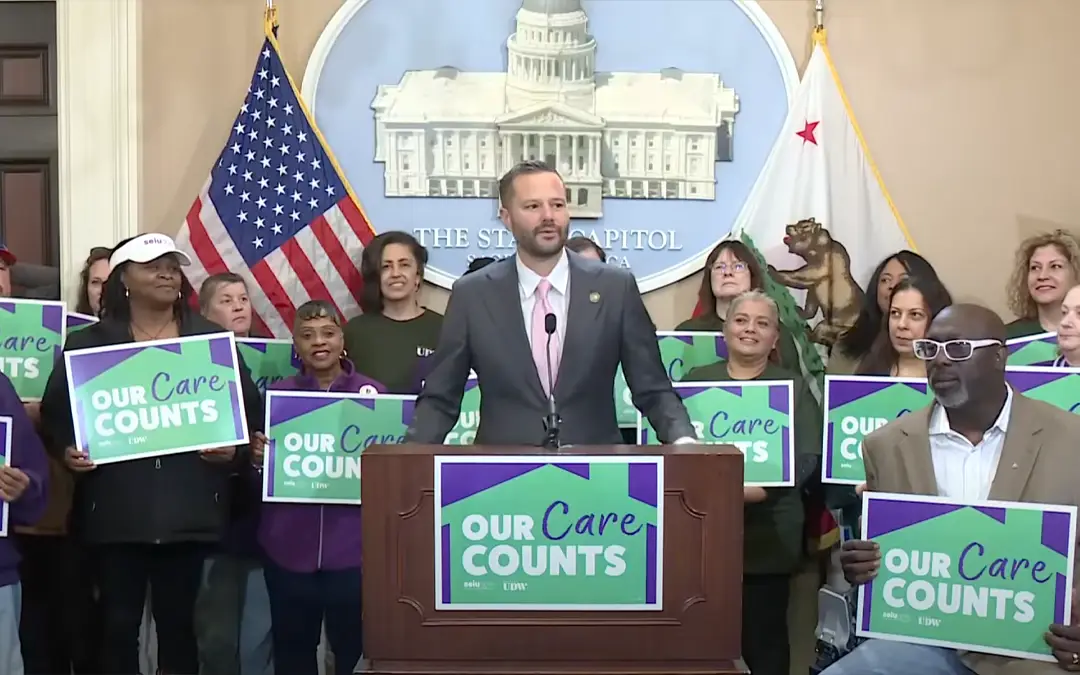IHSS Federal Policies | How National Decisions Affect Caregivers
IHSS and the Federal Government: Medicaid, Labor Rules, and National Policy
The federal government does not run IHSS directly — that authority belongs to California. But Washington plays a major role in shaping the program because over half of IHSS funding comes from federal Medicaid dollars. Federal labor rules also determine caregiver rights like overtime, sick leave, and wage protections. This means that national debates in Congress, Medicaid policy changes, and decisions from the U.S. Department of Labor can directly affect the paychecks of California caregivers and the stability of care for recipients.
How the federal government connects to IHSS
IHSS is funded through a federal–state partnership. The Centers for Medicare & Medicaid Services (CMS) matches California’s spending on home care through the Medicaid program. Federal labor laws and court rulings set the baseline protections for home care workers, while Congress debates overall Medicaid funding levels. These layers may feel distant, but they shape the ground under every IHSS provider and client.
- Medicaid funding: The federal government covers about 55% of IHSS provider wages and benefits.
- CMS oversight: Federal regulators approve California’s Medicaid plans, including IHSS structure.
- Labor standards: Federal rules guarantee overtime, minimum wage, and sick leave protections.
- Court decisions: Federal cases on labor classification and Medicaid policy can reshape caregiver rights.
Where the federal role helps
Federal investment makes IHSS possible. Without Medicaid’s financial match, California would not be able to fund the largest consumer-directed care program in the country. Federal labor protections have also been crucial: in 2015, the Department of Labor extended minimum wage and overtime protections to home care workers nationwide, closing a long-standing loophole. Federal stimulus packages during the COVID-19 pandemic temporarily increased Medicaid funding, which helped states like California avoid cuts and stabilize home care services.
- Federal Medicaid match keeps IHSS funded at sustainable levels.
- National labor protections safeguard basic rights like overtime pay.
- Emergency federal aid (like COVID relief) prevents deep program cuts.
Where the federal role creates risks
At the same time, federal decisions can threaten caregiver wages and client stability. Proposals to reduce Medicaid funding or re-label workers can ripple down to programs like IHSS. If caregivers were reclassified in a way that excluded them from labor protections, wages could drop below minimum wage — undoing years of progress. National budget fights in Congress often put Medicaid on the chopping block, leaving caregivers and recipients vulnerable to cuts they cannot control.
- Medicaid block grant or cap proposals could reduce funding for IHSS.
- Reclassification of caregivers could undermine minimum wage protections.
- Federal budget standoffs risk program instability at the state level.
Why the federal level matters
Even though IHSS is a California program, its backbone is federal funding and labor law. When Washington strengthens Medicaid and worker protections, caregivers and clients gain stability. When federal leaders cut funding or weaken standards, the consequences hit home almost immediately. That is why caregivers and advocates in California watch federal policy debates closely — because decisions made thousands of miles away in Congress or CMS offices can determine whether families here can afford care and whether caregivers can survive on their wages.
Bottom line: IHSS depends on the federal government for funding and worker protections. Medicaid dollars keep the program alive, and federal labor laws protect caregivers from being pushed below minimum wage. But national budget fights and policy shifts can put IHSS families at risk. Understanding the federal role means recognizing that the future of home care in California is tied not only to county boards and the state Legislature, but also to decisions made in Washington, D.C.

Caregivers lifting each other up
The IHSS Community: Shared Ideals, Challenges, and Support IHSS is more than a paycheck. It’s a lifeline that allows over half a million Californians — older adults, people with disabilities, and families — to live at home with dignity. For caregivers, it’s both work...

AB 283 in Plain English
AB 283, also called the In-Home Supportive Services Employer-Employee Relations Act (IHSSEERA), would shift IHSS bargaining from 58 separate counties to the state level…

The Illusion of Support
On paper, California’s In-Home Supportive Services (IHSS) program looks compassionate, keeping people at home and saving counties millions, but caregivers stay poor…
